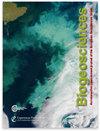热岩溶景观中同源细菌群落的分化:对永久冻土退化生态后果的影响
IF 3.9
2区 地球科学
Q1 ECOLOGY
引用次数: 0
摘要
摘要热岩溶过程可能在退化的永久冻土(PB)、热岩溶湖泊沉积物(SB)和湖泊水体(WB)中形成新的栖息地,以容纳新的细菌群落。本研究旨在通过研究青藏高原(QTP)细菌群落多样性的空间格局及其组装机制,对PB、SB和WB的配对进行研究。各生境细菌组合差异明显,WB生境α多样性低于SB和PB生境,β多样性高于SB和PB生境。然而,高达41%的操作分类单元(OTUs)是由PB、SB和WB共享的,这表明许多分类群是通过分散从同一来源起源的。SB和WB具有互向扩散效应,且均与PB相关。分散限制是形成PB和SB最主要的组合过程,而均匀选择是形成WB最主要的组合过程。3种生境的细菌群落与环境变量的相关性不同,但纬度、年平均降水量和pH是影响其β多样性的共同因子,而总磷是影响其组装过程的共同因子。我们的研究结果表明,热岩溶过程导致了不同的栖息地,这些栖息地具有不同的细菌群落,这些细菌群落在多样性、组装机制和环境驱动因素方面存在差异。本文章由计算机程序翻译,如有差异,请以英文原文为准。
Differentiation of cognate bacterial communities in thermokarst landscapes: implications for ecological consequences of permafrost degradation
Abstract. Thermokarst processes likely result in new habitats harboring novel bacterial communities in degraded permafrost soil (PB), thermokarst lake sediments (SB), and lake water (WB). Our study aimed to investigate the paired PB, SB, and WB across the Qinghai–Tibet Plateau (QTP) by assessing the spatial pattern of diversity as well as assembly mechanisms of these bacterial communities. Each habitat had distinct bacterial assemblages, with lower α diversity and higher β diversity in WB than in SB and PB. However, up to 41 % of the operational taxonomic units (OTUs) were shared by PB, SB, and WB, suggesting that many taxa originate from the same sources via dispersal. SB and WB had reciprocal dispersal effects, and both were correlated with PB. Dispersal limitation was the most dominant assembly process shaping PB and SB, while homogeneous selection was the most dominant for WB. Bacterial communities of the three habitats correlated differently with environmental variables, but latitude, mean annual precipitation, and pH were the common factors associated with their β diversity, while total phosphorus was the common factor associated with their assembly processes. Our results imply that thermokarst processes result in diverse habitats that have distinct bacterial communities that differ in diversity, assembly mechanisms, and environmental drivers.
求助全文
通过发布文献求助,成功后即可免费获取论文全文。
去求助
来源期刊

Biogeosciences
环境科学-地球科学综合
CiteScore
8.60
自引率
8.20%
发文量
258
审稿时长
4.2 months
期刊介绍:
Biogeosciences (BG) is an international scientific journal dedicated to the publication and discussion of research articles, short communications and review papers on all aspects of the interactions between the biological, chemical and physical processes in terrestrial or extraterrestrial life with the geosphere, hydrosphere and atmosphere. The objective of the journal is to cut across the boundaries of established sciences and achieve an interdisciplinary view of these interactions. Experimental, conceptual and modelling approaches are welcome.
 求助内容:
求助内容: 应助结果提醒方式:
应助结果提醒方式:


